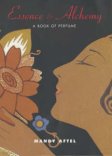
To say that Mandy Aftel took the world of natural perfumery by storm is hardly an overstatement. Little over a decade ago, while doing research for a novel, she found herself immersed in a collection of ancient perfume books. It was the start of a lifelong passion for natural essences: she put her literary ambitions on hold, and eventually established her very own perfume studio. Her current business, Aftelier, is a flourishing operation based in Berkeley, California. We take a closer look at her book Essence and Alchemy, which played a major role in the recent popularization of natural perfumery.
Essence and Alchemy is a practical guide to natural perfumery, which makes it slightly different from the books we've discussed so far. It kicks off with a chapter on the legacy of 17th century alchemy, in which the basic premises of natural perfumery are described at length. It's a critical discourse, in which the author expresses her clear, unabashed views on modern perfumery:
Most contemporary perfumes are 'linear' fragrances designed to produce a strong and instantaneous effect, striking the senses all at once and quickly dissipating. They are static; they do not mix with the wearer's body chemistry, nor do they evolve on the skin. (p.44)
The relationship between natural and synthetic perfumery remains a discursive issue throughout the subsequent chapters. One of the author's fundamental assumptions is that inorganic and synthetic substances lack the "life force" of nature (p.50): they are represented as demystified materials, hollow exponents of a world of rationality and logic. Natural essences, on the other hand, are described as being "inherently powerful" and elusive:
Natural essences possess a compressed vitality, a bioactive power that cannot be measured by chemical analysis but which manifests itself in their potent effect on our emotions and states of consciousness. [...] Only nature can create the smell of jasmine at nightfall. (p.49-50)
These seemingly endless discussions aside, Essence and Alchemy has a lot to offer to perfume enthusiasts. Besides the aforementioned historical overview of alchemy, it features an overview of techniques, raw materials, equipment, and safety precautions. The author gives plenty of practical suggestions from her personal experience with fragrant oils, and there's a list with suppliers' addresses if you want to get started right away. The final chapters on the seductive powers of natural essences, the bathing experience, and the use of fragrance in religious rituals are worth reading, although they actually lean heavily on supporting literature.
While I question many of the premises on which Essence and Alchemy is founded, I applaud its original, offbeat approach. There are some imprecisions in the book, but it's well-written and easily accessible. The paperback version is still largely available, and the decent price makes it definitely worth adding to one's library.
Essence and Alchemy: A Natural History of Perfume, Mandy Aftel
Salt Lake City: Gibbs Smith, Publisher (2004)
First published in 2001
Paperback, 236 pages
other titles by Mandy Aftel (related to smell):
Aroma: Cooking With Essential Oils (Artisan, 2004), co-written with chef Daniel Patterson
Scents & Sensibilities: Creating Solid Perfumes for Well-Being (Gibbs Smith, 2005)
It's a fascinating book and I love her style, even if I don't agree w/ all she says. I get mesmerized by her writing into believing I could indeed create perfumes, but, fortunately, reason returns before I place a massive order for oils. I love the all natural SIPs and one day hope to love more of Ms. Aftel's scents. I continue retrying and hoping.
Like Mandy Aftel says in the book, natural perfumery is “uniquely suited for home study”. I guess it explains the great success of her book. Creating your own perfumes doesn't do it for me, but I understand why it's so appealing.
I bought this book when I first became obsessed with perfume. I read it with the same euphoria as some women might read a romance novel!! I can't understand were my passion stems from…perhaps I was an alchemist in a former life! My dream is to one day have my own perfume boutique and commisson my own line of perfumes from artist that create natural and/or synthetic scents such as Mandy Aftel, Yosh, Ava Luxe, DSH, Guy Roberts, Maurice Roucel, Martin Gras and Olivier Cresp.
I'm only 25 and poor, so it'll be a while! In the meantime, It's nice to know other people share my love! BTW, are there any other books on perfume you recommend? TIA.
Marcello will probably be along to answer you, but in the meantime just wanted to let you know that you can see all the books he has reviewed by clicking on “Perfume books” under “Browse by Topic” on the right column.
thanks for your comment, raincheck88! There's a list of five “must have” books for beginners in the perfume book directory, and I'll make a list of “advanced” readings soon. So stay tuned!
I just got this book on a sale and have come about half-way now, and there sure are lots of passages and endless discussion about natural vs. synthetic which very much disturbed me, plus a whole lot of new age-saturated pages in the beginning which I also found off putting. But, when I reached the part of the book where she is describing how she blends different notes together in ackords and such I actually think the price I payed was worth it. Very interesting book if you can look past those annoying parts I just mentioned…
Glad you weren't completely let down 🙂